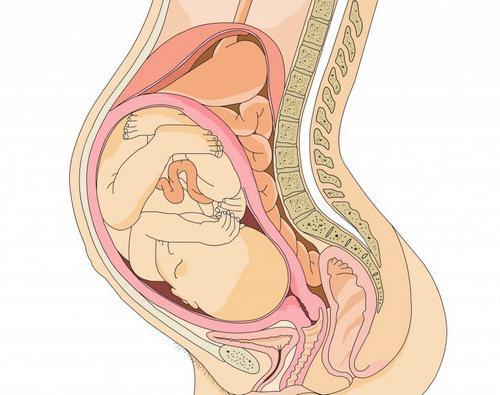Quite often, pregnant women need treatment that will help restore the condition of both the mother and the child. Today, the use of such medicinal product, like magnesium (sodium sulfate), which is prescribed during pregnancy. This drug can be injected or dripped for a long time.
Magnesia during pregnancy, or sodium sulfate has certain properties that can be used to cure various diseases during the gestation period, in addition, its use helps prevent miscarriage and all kinds of complications. The use of magnesia helps to accelerate the removal of fluid from the body, relax muscle muscles, normalize blood pressure, and relax the walls of blood vessels.
What diseases in pregnant women use magnesium

With the help of this drug, you can cure diseases such as:
- predisposition to thrombophlebitis;
- puffiness;
- high blood pressure (hypertension);
- eclampsia;
- preeclampsia with nephropathy;
- at not enough in the body of magnesium and the threat of premature birth.
Since when taking this drug in the form of a powder, it does not enter the bloodstream, its action will be more effective when administered intramuscularly or intravenously.
Concentration and dosage of magnesium
In what quantity and concentration it is necessary to administer the drug depends on individual characteristics pregnant woman and her condition. Usually, the administration of 25% magnesium once a day is sufficient. With the first degree of nephropathy, magnesia is prescribed twice a day, with the second - four doses.
Side effects
The introduction of the drug is carried out by a certain method, since this procedure is very painful. If magnesia is administered incorrectly, then this threatens with an inflammatory process, followed by death at the injection site. Heated liquid magnesia is injected, both intravenously and intramuscularly, thanks to a long needle at a slow pace.
Is it possible to drip magnesium during pregnancy?
Dangers of using magnesium during pregnancy. The opinions of doctors about the use of this drug differ from each other: some doctors confirm the effectiveness of magnesia, while others, on the contrary, refuse to administer it to patients. Uterine hypertonicity, according to experts, is a greater danger to the fetus than magnesia itself. However, there is a small risk of its falling into the body, which is expressed in impaired speech, a drop in blood pressure, vomiting, anxiety, drowsiness, headaches, weakness, flushing, sweating. If a pregnant woman has low blood pressure, then the drug is strictly forbidden to be administered, as well as to combine it with a calcium preparation and various biological food additives.
It is necessary to apply dosing the administration of the drug, since with a large amount of it, a pregnant woman may become intoxicated, comparable to narcotic. Also, the use of magnesia can affect the work of the respiratory center of the brain, i.e. disrupt its functioning. The use of magnesium in small quantities is not capable of harming either the mother or the child, but its overabundance provokes respiratory failure, both in the child and in the pregnant woman herself. It is forbidden to use magnesia immediately before the birth process, as this can prevent the opening of the cervix, which will greatly complicate childbirth.
When is it forbidden to inject or drip magnesia during pregnancy?

It is by no means possible to carry out treatment in the first trimester with the help of magnesia. pregnant woman in without fail is obliged to consult with the attending physician, whose task is to strictly and carefully control the use and dosage of each drug.
Conclusion
From all of the above, it becomes clear that magnesia can bring both benefits to the body of a pregnant woman and side effects if used incorrectly. It is necessary to use magnesia to provide a slight sedative effect, vasodilation, reduce eclampsia and preeclampsia, reduce swelling, reduce convulsions and hypertension, to remove excess fluid and stimulate kidney function, to reduce uterine tone.
The main thing, when using the drug, is to clearly calculate the dosage in order to avoid negative consequences on the health of a pregnant woman and her baby. Self-treatment with magnesium is not allowed. Only after consultation with a highly qualified specialist, it is possible to carry out treatment with sodium sulfate. The method of administration of magnesia (intravenous or intramuscular), in principle, does not matter, the main thing is the absence of certain diseases.
Magnesium is based on magnesium sulfate. It is available as a powder and liquid for intramuscular and intravenous injection. The powder, diluted with water and used orally, has a laxative effect, acting exclusively on the gastrointestinal tract.
Why magnesium is prescribed during pregnancy: main indications
Introduced intramuscularly by injection or intravenously by dropper, magnesia removes excess fluid from the body, relaxes muscle muscles, and regulates blood pressure. Also, the drug has a calming effect, relieves spasms and convulsions, normalizes heart rhythms, relaxes the walls of blood vessels, acts as a diuretic.
An indication for the use of magnesium during pregnancy is the threat of miscarriage due to uterine hypertonicity, magnesium deficiency in the body future mother, toxicosis and swelling in the 2nd half of pregnancy, high blood pressure, thrombophlebitis, convulsions with loss of consciousness (eclampsia).
 The process of introducing magnesia intramuscularly is painful and unpleasant. It should be injected very slowly, the syringe needle is used only long, the ampoule with the drug must be warmed before the injection. To reduce pain, it is possible to use novocaine to dilute magnesia, but only with the permission of a doctor.
The process of introducing magnesia intramuscularly is painful and unpleasant. It should be injected very slowly, the syringe needle is used only long, the ampoule with the drug must be warmed before the injection. To reduce pain, it is possible to use novocaine to dilute magnesia, but only with the permission of a doctor.
Through a dropper, magnesium is also injected slowly and for a long time to prevent a sharp drop blood pressure. If after droppers in a pregnant woman there is a significant decrease in pressure, then they are canceled. Only a very experienced nurse can be trusted to give injections and droppers, since inflammation and even tissue death can occur due to improper administration.
Treatment with magnesia should take place under the mandatory supervision of a physician. Also, only a doctor should control the intake of vitamins and.
Attention! During the entire first trimester and during the period of approaching childbirth, it is strictly forbidden to use the drug.
In late pregnancy, long-term treatment is not carried out in order to avoid fetal respiratory failure due to an excess of magnesium.
The percentage of magnesium and the dose of the administered drug is determined by the doctor after a comprehensive examination of the pregnant woman and an objective assessment of her condition. The use of magnesia is considered safe in the 2nd trimester of pregnancy and the first half of the 3rd trimester.
Contraindications to taking magnesium during pregnancy
A contraindication to the use of magnesia is acute or chronic arterial hypotension, the first trimester of pregnancy and prenatal condition. The drug can not be used simultaneously with any dietary supplements and other drugs containing calcium. The use of magnesia can cause the following side effects, the intensity of which depends on the individual characteristics of the body: a drop in blood pressure, drowsiness, headaches, flushing, anxiety, sweating, weakness, speech disorders. An overdose of the drug can lead to disturbances in the work of the respiratory center of the brain of a pregnant woman. With long-term treatment in late pregnancy, fetal breathing may be impaired.
Magnesia is often prescribed during pregnancy. The timing of treatment, dosage and concentration of the drug is determined by the attending physician, after conducting a preliminary examination. Treatment is carried out under the strict supervision of a doctor. Only an experienced medical worker in an outpatient or hospital setting can administer magnesium intramuscularly and intravenously.
In case of occurrence side effects you need to inform your doctor immediately. At correct application the drug is harmless to the fetus and the body of a pregnant woman.
Dropper - magnesia - during pregnancy. Magnesia during pregnancy: reviews and contraindications
Nowadays, more and more often, a mild prenatal period is becoming a rarity. The risk of developing complications during pregnancy increases every year. To eliminate a number of pathologies, hospitalization is necessary, during which various medications and infusion therapy are prescribed to patients. Often in the prenatal period, patients are prescribed a dropper. Magnesia for pregnant women, for example, may be recommended to reduce uterine tone. Thanks to the action of the remedy, premature birth is prevented.
Magnesia agent (dropper). Instruction. Description
The appointment of this medication, in recent times in particular, is very common. Magnesium sulfate is a white powder. From it can be prepared as a suspension for oral administration, and a solution for injection into a vein or into a muscle. Such a dropper (magnesia) during pregnancy helps to lower blood pressure due to the expanding effect on blood vessels, provokes slight drowsiness and soothes. The drug reduces swelling that occurs with increased daily diuresis, has an anticonvulsant effect. The drug reduces the tone of the muscles of the uterus and has a beneficial effect on the activity of the heart. 
Indications
This dropper (magnesia) during pregnancy is prescribed in case of increased risk premature birth, with seizures of epilepsy and convulsive syndrome. It is recommended to use the drug for hypertension with frequent crises. The medicine is prescribed to eliminate the symptoms of heavy metal poisoning, eclampsia. The drug is indicated for severe edematous syndrome, severe preeclampsia, lack of magnesium in the body.
Contraindications
The drug is not prescribed for reduced pressure, hypersensitivity, bradycardia. Such a dropper (magnesia) during pregnancy is not recommended for chronic kidney failure, malignant tumors, exacerbations of pathologies of the digestive system. Do not administer the drug immediately before childbirth (two to three hours). Use during lactation is contraindicated. Magnesia (dropper) is not prescribed in the first trimester of pregnancy. 
Side effects
In some cases, during therapy, there may be a general deterioration in the patient's condition. To negative consequences use of the drug include increased anxiety, increased sweating, headaches. The drug can provoke vomiting, drowsiness, nausea, severe hypotension, and polyuria. Before a magnesium dropper is placed during pregnancy, the doctor needs to warn the patient about the likelihood of side effects during therapy. In the event of undesirable consequences, the issue of continuing to receive the drug should be decided individually in accordance with the severity of the pathology and tolerability. If treatment is ineffective, adjustment of the dose and frequency of administration may be required.
Mode of application
This dropper (magnesia) during pregnancy is placed using a 25% solution of magnesium sulfate. The dosage is set taking into account the clinical picture individually. Before the start of administration, the medication is warmed to body temperature. Intravenous jet infusion of the solution is not allowed. This is due to the likelihood of a sharp decrease in pressure, which, in turn, can lead to disturbances in the blood flow and fetal hypoxia. The intensity of administration and duration of therapy depend on the general condition of the pregnant woman and the effectiveness of the medication. If a magnesium dropper (during pregnancy) is prescribed with calcium preparations, then the infusion is carried out into different veins. 
Magnesia during pregnancy (dropper). Reviews
How safe is the administration of the drug in the prenatal period? According to many experts, the use of medication during pregnancy does not pose a serious threat to the health of the unborn child and mother. However, to date, there is no exact information that confirms or refutes this. Reviews of the patients themselves about the medicine are very ambiguous. Some women claim that the use of the drug contributed to the improvement of well-being and facilitated the course of pregnancy. Others, on the contrary, talk about side effects that complicate the prenatal period. It has also been established that prolonged therapy with magnesium sulfate contributes to the accumulation of the substance in the body. This, in turn, provokes the occurrence of a hypoxic state in the fetus. Nevertheless, doctors recommend in cases where the choice is between no therapy and the continuation of the pregnancy, choose treatment. Magnesium sulfate, helping to reduce the tone of the muscles of the uterus, increases the chances of an unborn child to be born healthy. 
additional information
During treatment with magnesium sulfate, serious complications can occur. If a number of symptoms appear, therapeutic measures should be discontinued. In particular, an indication for stopping treatment is difficulty in breathing, a sharp decrease in pressure, and a slowdown in the heart rate. These manifestations indicate an overdose of the drug. In case of poisoning, the patient must be provided with timely adequate assistance. With hypermagnesemia, calcium preparations (calcium chloride or calcium gluconate) are prescribed. These medications are administered intravenously, slowly.
Many women believe that such a dropper (magnesia) during pregnancy can have Negative influence to a generic function. Of particular concern to patients is the introduction of medication in the third trimester. In practice, it takes only a few hours to remove magnesium sulfate. In this regard, receiving therapy before childbirth does not affect their course. In some cases, intravenous infusion of magnesium is the only way to prolong the gestational period. In this regard, experts recommend thinking carefully before refusing therapy. The use of the drug should be carried out under the close supervision of a doctor, in stationary conditions.
More information
Magnesia is a medicine consisting of a magnesium salt solution. This valuable microelement takes part in metabolism and physiological chemical reactions. Normally, it enters the body with food. A lot of magnesium in pumpkin, nuts and cereals.
After the onset of pregnancy, the need for magnesium increases, and the content of this chemical element in the blood is reduced - this is called "hypomagnesemia". When carrying a fetus, there is a risk of developing some complications that require an increase in the amount of magnesium in the body.
Why is magnesium used during pregnancy?
Doctors associate terrible conditions with magnesium deficiency: miscarriage, early and late preeclampsia, fetal weight deficiency. Magnesium is used by gynecologists to help with the following situations:
- premature birth;
- severe edematous syndrome;
- preeclampsia, eclampsia;
- convulsive syndrome;
- arterial hypertension;
- violation of the blood supply to the placenta.
It is important to know that when using magnesia there is a risk to the health of the child. The newborn may have respiratory problems, a low heart rate. Therefore, treatment is canceled a day before the probable date of birth. Doctors use this drug only when they are sure that the benefits will outweigh the possible side effects.
Use of the drug in the first trimester
Hypertonicity of the uterus in the first three months of pregnancy causes pain and a feeling of heaviness in the lower abdomen. You can also suspect this violation by the appearance of bloody discharge. A tense uterus can be felt by lying on your back and feeling your stomach with your hand.
information Tension of the muscles of the uterus can lead to spontaneous abortion, and therefore requires urgent treatment. A dropper with magnesium has a tocolytic effect. This means that when using the medicine, the tone of the uterus returns to normal, and the threat of early miscarriage recedes.
Magnesia in the second trimester
Violation of the uteroplacental circulation is usually detected in the fifth or sixth month. This diagnosis means that too little blood is supplied to the fetus, and the baby in the uterus suffers from a lack of oxygen. Because of this, intrauterine hypoxia and fetal growth retardation occur.
Violation of blood flow is accompanied by increased uterine tone. A dropper with magnesia allows you to relax the muscles of the uterus. In addition, in this case, magnesium acts as an antihypostatic agent: it protects the baby's brain from damage associated with oxygen deficiency.
Another condition that can occur during the second trimester is gestational hypertension. This is an increase in pressure first noticed after the 5th month of pregnancy. With this violation, a dropper with magnesium lowers blood pressure, relieves pain in the head and improves well-being.
Magnesia in the third trimester
Pregnancy develops in the third trimester, manifested high blood pressure and edematous syndrome. The magnesium dropper has an antihypertensive effect, reducing high blood pressure. Additionally, magnesium increases the excretion of fluid and relieves swelling.
information Late preeclampsia in rare situations leads to the development of an extremely serious complication - eclampsia. This violation threatens the life of mother and child. A magnesium drip is needed to reduce extremely high blood pressure and prevent seizures (or stop a seizure).
Another danger that occurs in the later stages is premature birth. The birth of a baby ahead of schedule threatens with respiratory disorders and can lead to the death of a newborn. Magnesium, by relaxing the muscles of the uterus, prevents the appearance of contractions, helps to preserve the fetus and bear a mature child.
Contraindications to treatment with magnesium
In no case should magnesium sulfate be prescribed to a pregnant woman in the following situations:
- low blood pressure (hypotension);
- Heart rate less than 60 per minute (bradycardia);
- heart rhythm and conduction disturbances;
- serious kidney disease;
- the appearance of contractions.
When using magnesia, unpleasant sensations may occur: nausea, general weakness, sweating. You should tell your doctor about side effects. He may reduce the dose of the drug or replace it with another similar drug.
Important Points
The dosage of the drug during pregnancy is different, and depends on the state of health of the woman. A 25% solution is calculated so that about 0.5-1 gram of the active substance enters the patient's body. In severe conditions, the dose is greatly increased. For example, in a seizure caused by eclampsia, magnesium is administered at a rate of 5 grams per hour.
information During the procedure, the patient lies on a couch or bed. The dropper is fixed next to the bed on a special tripod. A magnesium solution is injected through a needle inserted into a vein. The procedure usually takes no more than 2 hours. You need to get up after the dropper gradually, carefully, because the decrease in pressure causes dizziness and fainting.
The course of treatment with magnesia for pregnant women lasts no longer than 5 days. Sometimes only one dropper is needed (for example, to reduce pressure). Every woman has the right to refuse the procedure, but such a decision should be seriously considered. Remember that the drug is used to preserve the pregnancy and the health of the mother and fetus.
Magnesia, why is this drug popular? The medicine has a laxative and choleretic effect. The drug Magnesia instructions for use prescribes the use of constipation, poisoning, hypertension.
Composition and form of release
The medicine of magnesia is produced in the form of a powder for the preparation of a suspension for oral administration, which is sold in jars of 20 g, 25 g, 40 g, 50 g. Pharmacies also receive a solution for intravenous and intramuscular administration (injections in ampoules for injection). The active element of the drug Magnesia, from which it helps for many indications, is magnesium sulfate.
pharmachologic effect
Magnesia or magnesium sulfate is medicine, the therapeutic effect of which depends on the method of application. So, when taken orally, it has a laxative and choleretic effect. The laxative effect of the drug is due to its poor absorption, which leads to the creation of a high osmotic pressure in the intestine, which entails the accumulation of water, liquefaction of the intestinal contents and, as a result, increased peristalsis.
The choleretic effect is explained by its reflex effect on the mucous membrane of the duodenum. This remedy is an antidote for poisoning with salts of heavy metals. The drug Magnesia, from which it helps with urinary retention and for other indications, begins to act 0.5-3 hours after ingestion, the therapeutic effect lasts for 4-6 hours.
Intravenous and intramuscular use of Magnesia has a diuretic, vasodilating, antiarrhythmic, anticonvulsant, antispasmodic and sedative effect. Parenteral administration of large doses of the drug can cause tocolytic (prevents premature birth), hypnotic, curare-like (inhibits neuromuscular transmission) and narcotic effect of the drug.
The use of Magnesia can reduce the excitability of the respiratory center, reduce blood pressure, which is due to the calming properties of the drug, increase urination. After intravenous administration, the drug begins to act almost instantly, maintaining its therapeutic effect for half an hour. After intramuscular administration of magnesium sulfate begins to act after 60 minutes and continues for the next 3-4 hours.
Medicine Magnesia: what helps
Indications for the use of injections
Injections of the drug are prescribed for the treatment of diseases such as:
- hypomagnesemia, tetany;
- ventricular tachycardia;
- arterial hypertension, crisis state with cerebral edema;
- urinary retention;
- brain concussion;
- encephalopathy, epileptic seizure;
- poisoning with barium chloride, salts of heavy metals;
- bronchial asthma (as part of complex therapy).
What helps Magnesia in powder
The suspension is taken orally with:
- constipation;
- dyskinesia of the gallbladder,
- cholangitis and cholecystitis (for tubage);
- duodenal sounding;
- poisoning with salts of heavy metals;
- for bowel cleansing.
Contraindications

The drug Magnesia instructions for use prohibits oral use for rectal bleeding, intestinal obstruction, appendicitis, dehydration and hypermagnesemia. Magnesia injections for parenteral use are not prescribed for:
- arterial hypotension;
- oppression of the respiratory center;
- severe bradycardia and AV blockade;
- two hours before the onset of labor;
- chronic renal failure;
- individual hypersensitivity to one or more components that make up the drug.
Magnesia preparation: instructions for use
Use of injections
Intravenously or intramuscularly, most often a 25% solution. With hypertensive crises, convulsive syndrome, spastic conditions, 5-20 ml of the drug is prescribed. With eclampsia - 10-20 ml of a 25% solution up to 4 times a day. For the relief of seizures in children, 0.1-0.2 ml per kg of body weight is injected intramuscularly with a 20% solution. In acute poisoning - in / in 5-10 ml of a 10% solution.
Instructions for use of Magnesia powder
How to take magnesium sulfate as a laxative? Powder in the amount of 20-30 g is dissolved in 100 ml of water (preferably warm) and drunk at night or in the morning half an hour before meals. For chronic constipation, enemas are made - the same amount of powder per 100 ml of water. The drug as a laxative can be used only occasionally.
How to use the powder as a choleretic agent
Prepare a solution of 20 g of powder and 100 ml of water. Take 1 tablespoon 3 times a day before meals. In case of poisoning with heavy metal salts, a solution is taken orally - 20-25 g per 200 ml of water. With duodenal sounding, 50 ml of a 25% solution is injected through the probe.
Side effects
Magnesia can provoke such undesirable reactions of the body as:
- exacerbation of diseases of the digestive tract;
- diarrhea, vomiting, nausea;
- flatulence, thirst;
- in case of renal failure - signs of hypermagnesemia (dizziness);
- electrolyte imbalance, which manifests itself in the form of convulsions, arrhythmias, confusion, asthenia, increased fatigue.
Hypermangiemia on initial stage can be expressed by a decrease in blood pressure, headache, shortness of breath, weakness, vomiting, nausea, blurred speech, bradycardia, sudden "tides" of blood to the face. An excessive concentration of magnesium in the blood serum has the following symptoms:
- depression of the respiratory center;
- loss of deep tendon reflexes;
- violation of the conduction of the heart;
- heart failure; anxiety;
- increased sweating;
- increased urine production;
- deep sedation (oppression of consciousness);
- atony of the uterus (a sharp decrease in tone and loss of muscle contractility).
Application during pregnancy
The drug Magnesia during pregnancy is used with the threat of premature birth. As an anticonvulsant with a hypotensive effect, it is the drug of choice for the treatment and prevention of seizures in eclampsia. Therapy is initiated if diastolic blood pressure > 130 mm Hg. Art.
Magnesia therapy is carried out for another 24-48 hours after childbirth. The criteria for stopping therapy are the disappearance of seizures, the absence of hyperreflexia and convulsive readiness, a persistent decrease in blood pressure, and normalization of diuresis. The use of this drug during childbirth is contraindicated because it reduces the contractile activity of the myometrium.
Magnesium Sulphate for weight loss
Before any diet, it is desirable to cleanse the intestines and this remedy is used once. Why can not often resort to this method of cleansing the intestines? Magnesia irritates the gastrointestinal mucosa, disrupts the water-salt balance and, with frequent use, leads to dysbacteriosis. Above it was said about how to take the powder to cleanse the intestines.
In order to lose weight, you can take baths by adding a glass of powder or more to the bath. Bath time is 15-20 minutes. You need to take a bath before going to bed, for a course of 15 procedures carried out 2 times a week. After the procedure, you need to cover yourself with a warm blanket to achieve profuse sweating.
The action is that excess fluid is removed, puffiness is eliminated and metabolic processes are accelerated. The effect of losing weight is due to the loss of fluid, but after a while everything comes back. Many consider this method as an emergency remedy for weight loss - reviews confirm this.
Analogues and price
Magnesia can be replaced with drugs such as Kormagnezin, Magnesium sulfate-Darnitsa. You can buy medicine in Russia for 40-60 rubles. In Belarus, a package of powder costs from 20 kopecks to 1 ruble, the price of Magnesium injections is 0.65 - 3 bel. ruble. In Ukraine, the drug can be bought for 8 - 17 hryvnia.


